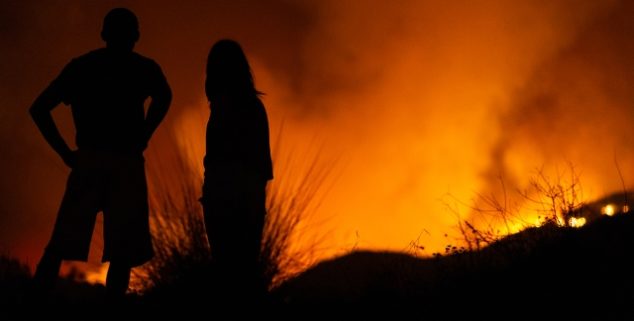Opinion
Disaster relief should include all victims
 A couple watches as a wildfire creeps closer. (Photo: Logan Bush, via Shutterstock)
A couple watches as a wildfire creeps closer. (Photo: Logan Bush, via Shutterstock)Around 25 years ago, Patricia immigrated to the U.S., settling in Santa Barbara with dreams of a better life. She cleans homes for a living in communities like Montecito and San Ysidro. During the Thomas Fire, she couldn’t go to work because many of the homes she cleaned were at risk. As mudslides came after the blaze, Patricia couldn’t go back to work for almost three months. Her husband, a landscaper, also couldn’t earn wages. Being undocumented, they were ineligible for federal disaster relief aid.
Through the 805 UndocuFund, Patricia received around $800 that helped cover rent, medical bills, and groceries so they could get back on their feet.
Throughout Ventura and Los Angeles counties, many families are still reeling from the 2018 Woolsey Fire.
As many immigrant families already live paycheck to paycheck, losing even one week’s wages can spell ruin for a household.
In Sonoma County, the 2017 North Bay Fires landed a devastating blow especially for the more than 38,000 undocumented people in the community. Hundreds of immigrant families impacted by the spate of catastrophic wildfires simply want the chance to rebuild their lives.
Undocumented immigrants are the backbone of our communities and our state economy. When disaster strikes — more frequently now with climate change — not all Californians have the same resources to bounce back. From farm workers living and working in vineyards or the strawberry fields of the Central Coast to domestic workers cleaning homes and caring for children and seniors in Paradise or Malibu, immigrant workers are the often unseen victims of the growing onslaught of wildfires.
As many immigrant families already live paycheck to paycheck, losing even one week’s wages can spell ruin for a household. All undocumented individuals are explicitly excluded from federal disaster aid through FEMA and from Disaster Unemployment Assistance. Worse yet, bosses often require laborers to work even when conditions become hazardous.
Enter California’s first-of-its-kind UndocuFund efforts. First came the UndocuFund for Fire Relief in Sonoma County, launched by the Graton Day Labor Center, the North Bay Organizing Project and North Bay Jobs with Justice in response to the deadly North Bay Fires in August 2017.
Through the UndocuFund for Fire Relief, we distributed more than $6 million in direct aid to over 2,000 immigrant families in Sonoma County.
Just months later, hundreds of miles away, a parallel effort took root.
In the aftermath of the Thomas Fire, the Central Coast Alliance United for a Sustainable Economy (CAUSE), the Mixteco/Indigena Community Organizing Project (MICOP), and Future Leaders of America (FLA) launched the 805 Undocufund.
Gov. Newsom just proposed $305 million in new disaster response spending, prioritizing groups he terms most at-risk.
With over $1.6 million in aid, we have helped over 1,000 families impacted by the Thomas Fire, the second largest fire in California’s history. Yet we still need to raise additional funds to provide relief for hundreds more in Ventura County. Some of these families have been waiting for help for more than a year now. At a time when we were still conducting volunteer-run community clinics to address needs from the 2017 Thomas Fire, the 2018 Woolsey Fire struck and made the need even greater.
Even as low-wage immigrant workers and undocumented families represent the front lines of California’s climate change fight, California’s current efforts to address climate impacts exclude them. California simply can’t continue to boast globally about our climate progress if the people hardest hit are falling through the cracks when we respond to climate chaos.
While we are proud of what we’ve done through both UndocuFunds, stopgap solutions like this aren’t sustainable over the long term.
Gov. Newsom just proposed $305 million in new disaster response spending, prioritizing groups he terms most at-risk. We call on the governor to truly ensure everyone is included in the state’s relief efforts. Specifically, we urge the governor and state lawmakers to form an emergency fire relief fund that undocumented residents can access.
Our leaders should also safeguard farm workers and other low-wage, predominantly immigrant outdoor workers directly affected by the fires and the toxic smoke they create.
Throughout California, undocumented workers care for our children and grandparents, clean our homes, and harvest food and wine for meals our families enjoy. For the sake of families like Patricia’s, California can do so much more to show our gratitude.
—
Editor’s Note: Maricela Morales is the executive director of Central Coast Alliance United for a Sustainable Economy (CAUSE). Christy Lubin is director of the Graton Day Labor Center.
Want to see more stories like this? Sign up for The Roundup, the free daily newsletter about California politics from the editors of Capitol Weekly. Stay up to date on the news you need to know.
Sign up below, then look for a confirmation email in your inbox.

Leave a Reply